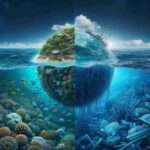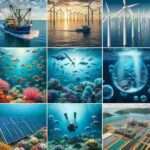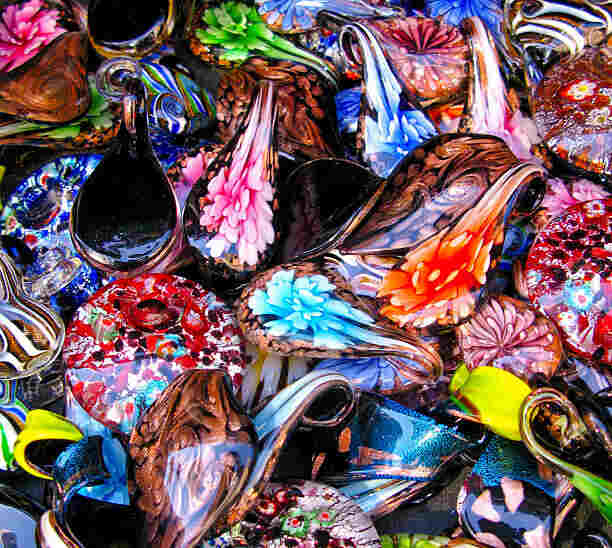Why is The Ocean Important? – Economic Resources
Why is the ocean important?: The ocean is critical to planetary health and human well-being, serving as a lifeline for ecological balance, economic prosperity, and sustenance. Covering more than 70% of the Earth’s surface, it regulates the global climate by absorbing carbon dioxide and heat, influencing weather patterns, and mitigating the effects of climate change.
Oceans are a vast reservoir of biodiversity, home to countless species that form the complex ecosystems necessary to sustain life on Earth. They provide a significant source of food, with billions of people relying on seafood for nutrition.
Additionally, the ocean supports numerous livelihoods through fishing, tourism, and shipping industries and provides recreational and cultural value. Its vast expanses also hold potential for renewable energy, such as wave and tidal power, promising a sustainable future. Thus, ocean health is inextricably linked to the health of our planet and humanity.

The Beauty of Sea Treasures
The treasures of the sea are mesmerizing and deeply fascinating. Sea gems, also known as ocean gems, are not only deep sea treasures, but also very important to many people. They have a major impact on our lives, influencing things like how we live and the richness of our culture
Diving Into The Depths: Marine Gems
Oceans hide many valuable things beneath their waves. Divers dive deep to find the most beautiful treasures. Among these treasures are pearls and corals, which are not only beautiful but also really important to economies around the world.
- Pearls: They are produced by special animals called mollusks and are known for their beauty.
- Corals: They grow on reefs and come in many bright colors.
- Ambergris: This rare substance is waxy and used in perfumery.
Cultural And Historical Significance
Gems of the sea transcend economic value, being deeply rooted in the traditions and customs of coastal societies. For centuries, they have symbolized status, been used in rituals and inspired countless myths.
| Gem | Cultural Importance | Historical Role |
| Pearls | Represent purity in many cultures | Used as royal adornments |
| Coral | Believed to have protective properties | Traded along ancient routes |
| Ambergris | Associated with healing | Coveted by medieval nobility |
Sea gems carry legacies that have shaped civilizations, fostering exploration and trade networks across the seas. Their enduring charm continues to embed itself in modern culture, proving their enduring legacy.
Economic impact of oceans
Fisheries and Aquaculture:
- Employment: Millions of people depend on fishing and aquaculture for their livelihood. Coastal communities, in particular, depend heavily on these industries for income and employment.
- Food supply: Fish and seafood are important sources of protein for billions of people worldwide. In many countries, fish forms a significant part of the diet.
Tourism:
- Coral reefs and marine life: Beautiful coral reefs and diverse marine life attract tourists, providing a significant source of income for the coastal region. Activities such as snorkeling, scuba diving and sea tours contribute to the local economy.
- Beaches: Pristine beaches and coastal areas are major attractions for tourists, supporting hospitality and service industries.
Economic importance of oceans in communications
Living near the coast makes people’s lives calmer. The vastness of the ocean can shrink our misery, offering a unique serenity. Coastal living improves mental health. Here’s how: (Importance of Ocean Resources)

Submarine Cables
The ocean is the primary route for submarine cables, which carry most international data traffic, including Internet, telephone and personal data. These underwater fiber-optic cables provide critical infrastructure for global communications, providing high-speed and reliable connections across continents. Economic impacts include:
- Internet connectivity: Supports worldwide Internet access, e-commerce, remote work and online services.
- Data Transmission: Enables secure and fast transfer of large amounts of data for businesses, governments and individuals.
- Cost efficiency: Submarine cables provide a cost-effective solution for long-distance communications compared to satellites.
Shipping and Maritime Trade
Oceans serve as highways for global maritime trade, transporting goods and commodities. Effective communication systems are essential for managing and coordinating shipping routes, port operations and logistics. Economic benefits include:
- Trade Facilitation: Efficient communication networks support the smooth operation of international trade, reducing delays and costs.
- Supply Chain Management: Real-time tracking and communication improves supply chain efficiency and reliability.
- Economic Growth: Increased maritime trade increases economic activity, creates employment and contributes to GDP.
Satellite Communication
Although most data traffic is carried by submarine cables, the oceans also play a role in satellite communications, especially for remote areas and maritime operations. Satellites are positioned over oceans to provide coverage for maritime vessels and isolated areas. Key contributions include:
- Maritime Navigation: Satellites provide vital communications for navigation, weather forecasting and safety at sea.
- Remote connectivity: Enable communications for offshore platforms, research stations and isolated communities.
- Disaster Response: Facilitating emergency communications during maritime disasters and search and rescue operations.
Tourism and Recreation
Communication infrastructure supporting coastal tourism and recreational activities is vital for economic development in coastal areas. Reliable communication enhances visitor experience and security. Economic benefits include:
- Tourism revenue: Improved connectivity attracts tourists, boosting the local economy through spending on services and amenities.
- Employment: Creates jobs in the tourism and hospitality sector.
- Security: Ensures the security of tourists through effective communication channels.
Economic importance of oceans to ecosystems
The well-being of our planet depends heavily on the various marine ecosystems. These underwater habitats are like precious gems scattered across the ocean floor, and they are crucial to life both in water and on land. They connect people to work, make sure they have enough food to eat, and even the air they breathe. Let’s take a closer look at how these habitats are important to different types of life.(Do you want to know the Oceanic Influence on Japan? Click to know.)

Coral Reefs: Rainforests Of The Sea
Coral reefs are like bustling underwater cities, full of bright colors and lots of activity. Although they cover less than 1% of the ocean floor, they are home to nearly a quarter of all marine life. These vibrant communities provide food, shelter and a safe place for many underwater creatures to spawn. Key contributions include:
- Fish nurseries: Tropical fish species depend on reefs for survival.
- Protection: Reefs protect coastlines from storms and erosion.
- Discoveries: They hold the potential for medicinal and scientific breakthroughs.
But just as we worry about cutting down rainforests, we also need to protect coral reefs. Preserving these underwater treasures is crucial to keeping a wide variety of animals alive and well.
Deep-sea Organisms And Unique Habitats
The deep sea is less explored but equally important. It contains organisms that defy imagination with adaptations to harsh conditions. These unique habitats are essential to maintaining the balance of marine ecosystems.
| Organism | Habitat | Role |
| Hydrothermal Vent Communities | Deep Sea | Support diverse life forms |
| Bioluminescent Creatures | Midwater | Aid in food chain dynamics |
| Mysterious Microbes | Seafloor Sediments | Drive nutrient recycling |
These habitats are threatened by human activities such as deep-sea mining and overfishing. Protecting these organisms ensures the sustainability of our oceans.
Cultural and Social Significance
Cultural Heritage:
- Traditional Practices: Many coastal communities have rich cultural traditions associated with the sea, including fishing techniques, boat building and maritime navigation.
- Art and Mythology: The sea and its creatures often feature prominently in local art, folklore and mythology, creating cultural identity.
Recreational Activities:
- Leisure and sports: Activities such as sailing, fishing, surfing and beachcombing are popular recreational pursuits that improve quality of life and provide social and health benefits.
Importance of marine economy in terms of fuel
Oceans are full of resources that support human life and prosperity. All over the world, communities depend on ocean gems for livelihood and growth. These marine treasures are not only beautiful but spark economic engines in many regions. They breathe life into commerce and provide sustenance to millions.
Fishing Industries: Sustenance And Commerce
Fishing is the heartbeat of the coastal economy. It feeds the family and supports work from fishing to selling. Let’s dive into its implications:
- Nutrition – Fishermen gather the ocean’s bounty that fills plates worldwide.
- Jobs – From anglers to market vendors, fishing creates a chain of employment.
- Exports – Nations trade their catch, earning valuable foreign currency.
Pearls And Precious Corals: A Luxury Market
The allure of pearls and corals transcends time. They sculpt a niche of elegance in the market.
| Marine Luxury | Economic Contribution |
| Pearls | Synonymous with wealth and grace, pearls fuel a high-end industry. |
| Precious Corals | Used in fine jewelry, corals add a pop of color and desirability to luxury goods. |
This sector not only attracts investors but also encourages skilled crafts. From divers to artisans, many talents operate this luxurious part of the marine economy.
Importance of the ocean in terms of nutritional needs
The ocean plays an important role in meeting the nutritional needs of the world population. Its importance in this context is multidimensional, including food, essential nutrients and sustainable food sources. Here are key points that highlight the importance of the ocean in terms of nutritional needs:
Source of Protein
Oceans are a major source of animal protein, especially in coastal and island communities. Fish and other seafood provide a significant portion of dietary protein for billions of people worldwide.
- Fish and seafood: These are rich in high-quality protein that is easily digestible and contains all the essential amino acids.
- Global dependence: More than 3 billion people depend on seafood as a primary source of protein.
Essential Nutrients
Seafood is not only a source of protein but also provides important nutrients for human health.
- Omega-3 fatty acids: Fish, especially fatty fish such as salmon, mackerel and sardines, are rich in omega-3 fatty acids, which are important for heart health, brain function and reducing inflammation.
- Vitamins and minerals: Seafood is a good source of vitamins such as B12 and D, and minerals such as iodine, zinc and selenium, which are essential for a variety of bodily functions, including thyroid function, immune response and bone health.
Economic and Nutritional Security
The ocean’s role in food supply also has significant economic implications, particularly for developing countries.
- Employment: Fishing and aquaculture industries provide jobs for millions of people, supporting livelihoods and economic stability.
- Food Security: Access to affordable and nutritious seafood helps alleviate hunger and malnutrition in vulnerable populations.
Importance of the ocean in pharmaceuticals
Imagine searching for treasure in the deep blue sea that could save lives. This is not a story; It’s real. Underwater, a hidden world holds secrets to new drugs. We call it ‘Pharmaceuticals from the Deep’

Sea Sponges And Cancer Treatments
Sea sponges fight disease. Scientists use them to make powerful medicines. These drugs attack cancer cells but keep them healthy. Let’s dive into some details:
- Cytarabine: A sponge drug that fights leukemia.
- Eribulin: Inspired by sponges, it fights breast cancer.
Researchers continue to search the ocean. They want to find more sponges to help us stay healthy.
Medicinal Compounds From Marine Biodiversity

The ocean is like a giant pharmacy. Many sea creatures make substances that can cure illnesses. Here’s a look at this amazing diversity:
| Creature | Compound | Use |
| Cone Snails | Ziconotide | Pain relief |
| Tunicates | Trabectedin | Cancer treatment |
| Mollusks | Prialt | Chronic pain |
With new discoveries all the time, the sea may hold cures for many more diseases. Each marine animal could be the key to the next big advance in health.
Importance of sea in terms of therapeutic power
The ocean is like a big treasure chest full of secrets. It’s not just the glittering ocean gems that grab our attention, but the special way they can calm us down. Let’s see how the special gift of the sea can make us feel happy and healthy.
Thalassotherapy And Mineral-rich Seawater
Thalassotherapy taps into the restorative properties of the sea. This centuries-old practice uses sea water for its therapeutic benefits. Here’s what makes it special:
- Rewards the body with minerals like magnesium, potassium and calcium
- Bathing in sea water helps to rejuvenate the skin and increase blood circulation
- Sea mud and algae are natural exfoliants and detoxifiers
Seawater heals with its mineral richness, echoing the human body’s own fluid composition. Plunge into the ocean, and you’re immersed in a natural, original spa designed by Mother Nature.
Coastal Well-being And Mental Health
Living near the coast makes life peaceful. The vastness of the ocean can shrink our misery, offering a unique serenity. Coastal living improves mental health. Here’s how:
| Activity | Benefits |
| Beach Walks | Encourage meditation and mindfulness |
| Swimming | Reduces stress and elevates mood |
| Sunlight | Stimulates Vitamin D production, fights depression |
The sound and sight of the ocean itself contributes to mental well-being. The continuous crashing of the waves provides a natural white noise, perfect for distracting the mind.
FAQ On Why is the ocean important?
Q1. What is 7 Ocean Resources?
Q2. Why is the ocean a crucial source of food?
Ans: The ocean provides a significant portion of the world’s protein through fish and seafood, which are essential for the nutrition of billions of people. It also supports the livelihoods of millions who depend on fishing and aquaculture industries.
Q3. In what ways does the ocean support the economy?
Ans: The ocean is vital for global trade, with shipping routes carrying goods between continents. It also supports tourism and recreation industries, offering economic opportunities for coastal communities and beyond. Additionally, the fishing industry provides jobs and food security.
Q4. Why is ocean health important for human health?
Ans: A healthy ocean supports clean air and water, a stable climate, and abundant food resources. Conversely, a degraded ocean can lead to issues like food insecurity, economic loss, and health problems due to pollution and loss of biodiversity.
Q5. How does the ocean contribute to scientific research?
Ans: The ocean is a frontier for scientific discovery, offering insights into marine biology, climate science, and geology. Research in oceanography helps us understand natural processes, discover new species, and develop technologies for sustainable management of ocean resources.
In Conclusion
Oceans are essential to the health of the planet and human well-being, covering more than 70% of the Earth’s surface and playing an important role in regulating the global climate by absorbing carbon dioxide and heat. They support a vast array of biodiversity, providing habitat for countless species and maintaining ecological balance. The ocean is a major source of food and nutrition, on which billions of people worldwide depend. It also supports economic activities such as fishing, tourism, and shipping, providing livelihoods and recreational opportunities. Additionally, the ocean holds the potential for renewable energy, contributing to a sustainable future. Overall, ocean health is vital to the ecological stability and prosperity of our planet and its inhabitants.













